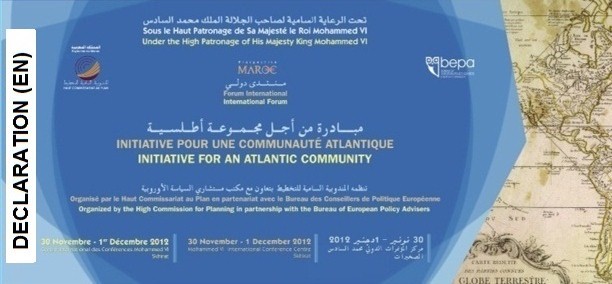
- The systemic nature of the economic crisis is compounded by the sovereign-debt crisis of the euro zone which is now dampening the prospects of an upturn in economic growth in the member states of the European Union and in neighbouring countries.
- It is too early to assess the political changes that have occurred on the southern shores of the Mediterranean Sea as regards both their institutional sustainability and their ability to provide the appropriate solutions to respond to the human development needs of the populations involved.
- The doubts raised by some of the key players as regards the relevance of a common Atlantic approach are gradually turning into an interest which needs to be transformed into effective contributions towards realising the reflections and actions in train. The deteriorating security situation in the Sahel calls on players in both the Atlantic space and the western Mediterranean Basin to take concerted actions based on collective responsibility.
- The issues identified in 2009, whether those relating to food security, energy security, the movement of people and knowledge-sharing, will continue to be top priorities. These strategic priorities should take account of the ongoing international work currently taking place on Global Trends 2030 at the national and international levels to involve more Atlantic players in their identification and their collective ownership. In this regard, it appears that the dynamics fuelled by maritime clusters are key drivers for innovation and creativity within the Atlantic space, paving the way for a “from sea to land” approach rather than for a “from land to sea” approach.
2. We declare that an “Atlantic community “would be the ideal framework for a new form of governance that brings together non-governmental actors , including business and civil society organisations , and in particular, women and youth associations into the formulation and implementation of concerted policies under the priority themes proposed. These policies must be designed within the framework of an approach that places humankind at the centre of common concerns and revisits development models.
3. This new collective governance must in no way be built on new institutions which are likely to strengthen multilateral bureaucracies; instead it should :
- have recourse to methods of collaboration and partnership by diversifying the mutual oversight of policies as well as strategic planning and evaluation;
- reinforce democratic control of common policies through the involvement of parliaments and the greater participation of local governments. In this connection, respect for cultural diversity enhances ties of proximity and sense of belonging to an Atlantic community.
- in order to give further concrete substance to this governance, we recommend :
i. the engagement of the Central Banks of the Atlantic space gathered during meetings of the International Monetary Fund and the World Bank. These meetings should facilitate decision-making at the global level with a view to relaunching economic growth through reinforcing interdependence and shared responsibility;
ii. the creation of Atlantic focus and informal consultation groups :
1. within the United Nations’bodies , especially the FAO, WFP and IFAD as regards food security;
2. with regional development banks and similar institutions operating in the Atlantic space;
iii. Convening an energy security conference as a follow-up to Rio +20;
iv. Establishing a multilateral consultation mechanism for the collective ownership of the knowledge economy, based on the principles governing the European Commission’s 2020 objective;
v. Convening a conference on human security in the Atlantic space to address collective low-intensity vulnerabilities and to create a framework of co-responsibility ;
4. The following road map will allow for an efficient programme of initiatives for the next two years focusing on:
- the creation of Atlantic networks of young entrepreneurs, historians and economists;
- maritime economy, energy, food and agriculture and security.
5. The progress achieved in the implementation of these initiatives shall be evaluated during the Skhirat Forum III in 2014.
6. We commend Morocco for having accepted to set into motion a monitoring structure of the Initiative for an Atlantic Community within the framework of a partnership with BEPA and we confirm the importance attached to this focal point set up within the High Commission of Planning.
7. We would like to express our gratitude to His Majesty King Mohammed VI for His Royal Patronage and our thanks to the High Commission of Planning for the high quality of the organisation of the Second Internal Forum, which was once again imbued with the hospitality of the Moroccan people.
Skhirat, Morocco
On this day of the first of December, 2012.
 Déclaration Skhirat (Fr)
Déclaration Skhirat (Fr)